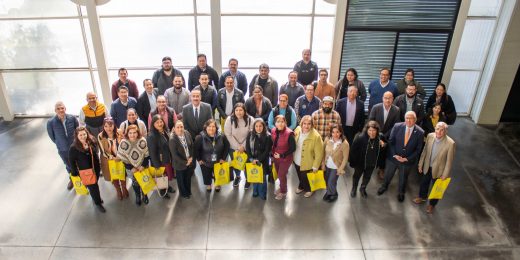Academia para el desarrollo sustentable
University Academy for Sustainable Development

La Academia Universitaria para el Desarrollo Sustentable (AUDS) de la Universidad Autónoma de Nuevo León representa un esfuerzo institucional visionario que busca consolidar la educación, la investigación y la práctica de la sustentabilidad como ejes fundamentales en la vida universitaria. Su creación responde a la necesidad de enfrentar los grandes desafíos ambientales y sociales de nuestro tiempo, preparando a las nuevas generaciones para actuar con responsabilidad frente a la crisis climática, la pérdida de biodiversidad, el manejo de los recursos naturales y la construcción de sociedades más justas y resilientes.
La misión principal de la AUDS es integrar los principios del desarrollo sustentable en todas las áreas de la vida académica, contribuyendo a la formación de profesionales y ciudadanos comprometidos con la protección del ambiente y el bienestar social. Para lograrlo, la AUDS ha desarrollado un enfoque multidisciplinario que constituye una de sus mayores fortalezas: sus integrantes son especialistas de distintas áreas del conocimiento, ciencias ambientales, economía, sociología, ingeniería, salud, derecho y educación, lo que permite abordar los problemas ambientales desde diferentes perspectivas y construir soluciones integrales y adaptadas a diversos contextos.
Desde su origen, la AUDS ha tenido un impacto directo en la innovación curricular de la UANL, incorporando valores, prácticas y saberes relacionados con la sustentabilidad en la formación académica. Se han diseñado e impartido cursos especializados sobre cambio climático, gestión de recursos naturales, energías renovables, eficiencia energética y desarrollo sustentable, entre otros. Estos cursos se ofrecen no solo a estudiantes de carreras ambientales, sino también a estudiantes de otras disciplinas, con el propósito de promover una educación integral que fomente la educación para la sustentabilidad en todos los ámbitos profesionales.
Realización de 97 eventos académicos de la AUDS transmitidos a través de diversas plataformas digitales en modalidad presencial
-Con más de 13,716 participantes
-103 expertos de los cuales son 83 nacionales y 20 internacionales
Asimismo, la investigación científica constituye un pilar esencial de la AUDS. A través de proyectos innovadores, investigadores y estudiantes trabajan en temáticas de gran relevancia como la conservación de la biodiversidad, la gestión sustentable del agua, la mitigación del cambio climático y el desarrollo de tecnologías limpias. Dichos proyectos no solo aportan al avance del conocimiento, sino que generan soluciones prácticas y aplicables que contribuyen a atender problemáticas locales y globales, fortaleciendo la vinculación de la universidad con la sociedad.
Otra función destacada de la Academia es su capacidad de incidir en la planificación y operación institucional. La AUDS promueve criterios de sustentabilidad en la gestión universitaria, reflejados en programas de separación y manejo de residuos, en la promoción de la movilidad sustentable y en iniciativas de ahorro energético y eficiencia en el uso del agua. Estas acciones no solo reducen la huella ambiental de la universidad, sino que constituyen un modelo replicable para otras instituciones de educación superior.
Además, la AUDS se ha consolidado como un espacio de sensibilización y participación social. Cada año organiza congresos, conferencias, foros y talleres dirigidos tanto a la comunidad universitaria como al público en general, con el objetivo de generar un diálogo abierto sobre los retos y oportunidades de la sustentabilidad. Estos encuentros inspiran a estudiantes, académicos, empresarios y representantes gubernamentales a emprender acciones conjuntas que fortalezcan la transición hacia un futuro sustentables.
La creación de la Academia Universitaria para el Desarrollo Sustentable constituye un importante suceso en la historia de la UANL, ya que alinea la misión académica con los Objetivos de Desarrollo Sostenible promovido por la ONU, con la responsabilidad de formar líderes capaces de enfrentar los desafíos ambientales y sociales del siglo XXI. Los beneficios que genera abarcan el ámbito educativo, el científico, el institucional y el social, confirmando a la UANL como una universidad de vanguardia, comprometida con el desarrollo sustentable.

